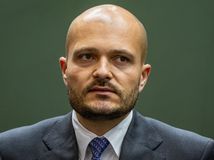„I can give you an immaterial soul. I’ll give you indeterminism. It doesn’t matter. What I’m going to say is that is not going to help.
I’m going to say, in the end, what you do flows from the way you are, even in your deepest spiritual characteristics.
You’ve somehow got to get to be responsible for being the way you are. But you can’t… You can’t get back behind yourself in such a way as to be responsible for the kind of person you are.
Whichever way it goes, you’ve got to somehow have chosen it, but you can’t choose it unless you already exist as a creature who has preferences. You can’t get back behind yourself in such a way as to be responsible for the kind of person you are.
There’s a two-word Latin phrase; you can’t be causa sui. You can’t be the cause of yourself.
But you’d somehow have to get to be the cause of yourself to take fundamental ultimate responsibility for yourself and therefore for your actions that flow from the way you are, and therefore we do not have free will. I think you can’t escape that conclusion.“
– Galen Strawson, Closer To Truth, Mysteries Of Free Will, Feb 12, 2018
„The desire for ‚freedom of will‘ in the superlative, metaphysical sense, such as still holds sway, unfortunately, in the minds of the half-educated, the desire to bear the entire and ultimate responsibility for one’s actions oneself, and to absolve God, the world, ancestors, chance, and society therefrom, involves nothing less than to be precisely this causa sui, and, with more than Munchausen daring, to pull oneself up into existence by the hair, out of the slough of nothingness.“
– Friedrich Nietzsche, Beyond Good and Evil, 1886, 21, translation: H. Zimmern, December 7, 2009
He believes that the desire to absolve external factors from responsibility for one’s actions involves the impossible task of being the cause of oneself, or „causa sui“.
x
If moral facts exist, then saying that murder is wrong isn’t merely an opinion. Most Americans accept that “murder is wrong” is a moral fact. Therefore, we have no problem imposing that moral law on society and holding all people, regardless of their personal beliefs and opinions, to that moral standard.
Of course, moral facts aren’t provable the same way objective facts are. They are arrived at through reasoned judgment. I can “prove” the table is hard. I can “prove” that vaccines prevent disease. But I can’t “prove” murder is wrong, or that it’s wrong to steal. I accept that murder is wrong and that stealing is wrong through reasoned judgment….
„The causa sui [something being its own cause] is the best self- contradiction which has been thought up so far, a kind of logical rape and perversity. But the excessive pride of human beings has worked to entangle itself deeply and terribly with this very nonsense. The demand for „freedom of the will,“ in that superlative metaphysical sense, as it unfortunately still rules in the heads of the half-educated, the demand to bear the entire final responsibility for one’s actions oneself and to relieve God, the world, ancestors, chance, and society of responsibility for it, is naturally nothing less than this very causa sui and an attempt to pull oneself into existence out of the swamp of nothingness by the hair, with more audacity than Munchhausen.[xiv] Suppose someone in this way gets behind the boorish simplicity of this famous idea of the „free will“ and erases it from his head, then I would invite him now to push his „enlightenment“ still one step further and erase also the inverse of this incomprehensible idea of „free will“ from his head:
—>>> ***I refer to the „unfree will,“ which leads to an abuse of cause and effect***.
People should not mistakenly reify „cause“ and „effect“ the way those investigating nature do (and people like them who nowadays naturalize their thinking—), in accordance with the ruling mechanistic foolishness which allows causes to push and shove until they „have an effect.“ People should use „cause“ and „effect“ merely as pure ideas, that is, as conventional fictions to indicate and communicate, not as an explanation. In the „in itself“ there is no „causal connection,“ no „necessity,“ no „psychological unfreedom,“ no „effect following from the cause“; no „law“ holds sway. We are the ones who have, on our own, made up causes, causal sequences, for-one-another, relativity, compulsion, number, law, freedom, reason, and purpose, and when we fabricate this world of signs inside things as something „in itself,“ when we stir it into things, then we’re once again acting as we have always done, namely, mythologically.
—–>>>>> ****The „unfree will“ is a myth****: in real life it’s merely a matter of strong and weak wills.—It is almost always already a symptom of something lacking in a thinker himself when he senses in all „causal connections“ and „psychological necessity“ some purpose, necessity, inevitable consequence, pressure, and unfreedom. That very feeling is a telltale give away—the person is betraying himself. And if I have seen things correctly, the „un-freedom of the will“ has generally been seen as a problem from two totally contrasting points of view, but always in a deeply personal way: some people are not willing at any price to let go of their „responsibility,“ their belief in themselves, their personal right to their credit (the vain races belong to this group—); the others want the reverse: they don’t wish to be responsible for or guilty of anything, and demand, out of an inner self- contempt, that they can shift blame for themselves somewhere else. People in this second group, when they write books, are in the habit nowadays of taking up the cause of criminals; a sort of socialist pity is their most attractive disguise. And in fact, the fatalism of those with weak wills brightens up amazingly when it learns how to present itself as „la religion de la souffrance humaine“ [the religion of human suffering]—that’s its „good taste.““
Beyond Good and Evil, aphorism #21.
I’d avoid citing Nietzsche if you wish to advocate for Determinism. He’s an existential philosopher, among the most difficult to grasp.
x
It appears to me more and more, thanks to Bruce Wilshire’s essay on the difficulties that William James encountered while trying to define empirically psychology, that there is a common theme linking the process that some have gone through when they hit the wall of metaphysics. The case is interesting, and Nietzsche is one of those having been hit quite badly. Among well known philosophers, he and Spinoza ended up flirting with the idea of strict determinism.
Let us begin with Nietzsche, whose book Tho Spoke Zarathustra is heavy on this theme. As some mentioned elsewhere, Nietzsche discovered that some laws of physics suggest the notion of an eternal reoccurrence. This would mean that there is no room for any freedom whatever, since we are due to relive the exact same life, to have the exact same thoughts, to answer the exact same way to the same persons, etc…
William James? He starts his treatise bashing against metaphysics, and laughing at the idea of free will. In fact, William James‘ stance early in his work of 1890, evokes that of Sapolsky.
Same with Sapolsky, whose book Behave forced him down a certain path.
But Nietzsche, not without committing to several contradictions, proposed the overman principle, which by nature is an invitation to create our own freedom.
William James, within the same treatise, by chap5-6, changes his mind, and accepts the idea that we’re not about to achieve one to one brain-correlate to mental state mappings. He was later to publish a deep thesis in favor of free will (The Will To Believe).
Same thing happened to Dawkins, exact same thing. In the selfish gene, he proposes a thesis which supposes intentionality while rejecting it at the same time. Anyone who has read his entire work (footnotes included) knows that he essentially embraced the Extended Synthesis.
And I predict that if he lives at least 10 more years, the same faith is awating Sapolsky
x
See also this from Nietzsche’s book Twilight of the Idols, chapter The Four Great Errors, section 7…
Today we no longer have any pity for the concept of “free will”: we know only too well what it really is—the foulest of all theologians’ artifices, aimed at making mankind “responsible” in their sense, that is, dependent upon them. Here I simply supply the psychology of all “making responsible.”
Wherever responsibilities are sought, it is usually the instinct of wanting to judge and punish which is at work. Becoming has been deprived of its innocence when any being-such-and-such is traced back to will, to purposes, to acts of responsibility: the doctrine of the will has been invented essentially for the purpose of punishment, that is, because one wanted to impute guilt. The entire old psychology, the psychology of will, was conditioned by the fact that its originators, the priests at the head of ancient communities, wanted to create for themselves the right to punish – or wanted to create this right for God. Men were considered “free” so that they might be judged and punished – so that they might become guilty: consequently, every act had to be considered as willed, and the origin of every act had to be considered as lying within the consciousness (and thus the most fundamental counterfeit in psychologicis was made the principle of psychology itself).
Today, as we have entered into the reverse movement and we immoralists are trying with all our strength to take the concept of guilt and the concept of punishment out of the world again, and to cleanse psychology, history, nature, and social institutions and sanctions of them, there is in our eyes no more radical opposition than that of the theologians, who continue with the concept of a “moral world-order” to infect the innocence of becoming by means of “punishment” and “guilt” Christianity is a metaphysics of the hangman.
x
.. and in Twilight of the Idols, Nietzsche continues and concludes The Four Great Errors in the next section 8…
What alone can be our doctrine? That no one gives man his qualities – neither God, nor society, nor his parents and ancestors, nor he himself. (The nonsense of the last idea was taught as “intelligible freedom” by Kant – perhaps by Plato already.) No one is responsible for man’s being there at all, for his being such-and-such, or for his being in these circumstances or in this environment. The fatality of his essence is not to be disentangled from the fatality of all that has been and will be. Man is not the effect of some special purpose, of a will, and end; nor is he the object of an attempt to attain an “ideal of humanity” or an “ideal of happiness” or an “ideal of morality.” It is absurd to wish to devolve one’s essence on some end or other. We have invented the concept of “end”: in reality there is no end.
One is necessary, one is a piece of fatefulness, one belongs to the whole, one is in the whole; there is nothing which could judge, measure, compare, or sentence our being, for that would mean judging, measuring, comparing, or sentencing the whole. But there is nothing besides the whole. That nobody is held responsible any longer, that the mode of being may not be traced back to a causa prima, that the world does not form a unity either as a sensorium or as “spirit” – that alone is the great liberation; with this alone is the innocence of becoming restored. The concept of “God” was until now the greatest objection to existence. We deny God, we deny the responsibility in God: only thereby do we redeem the world.




















Celá debata | RSS tejto debaty